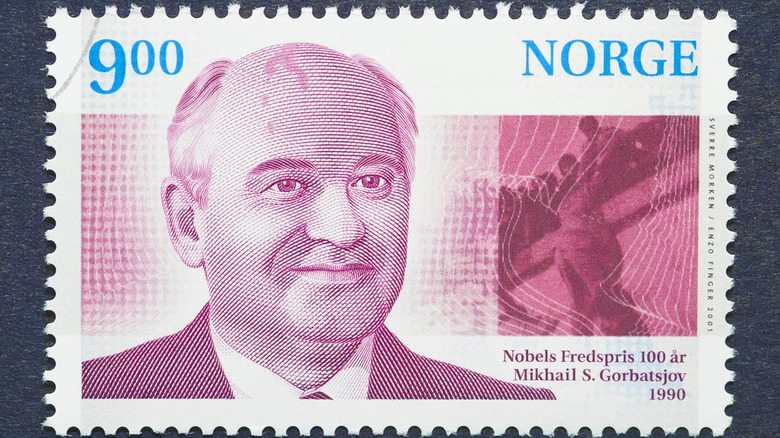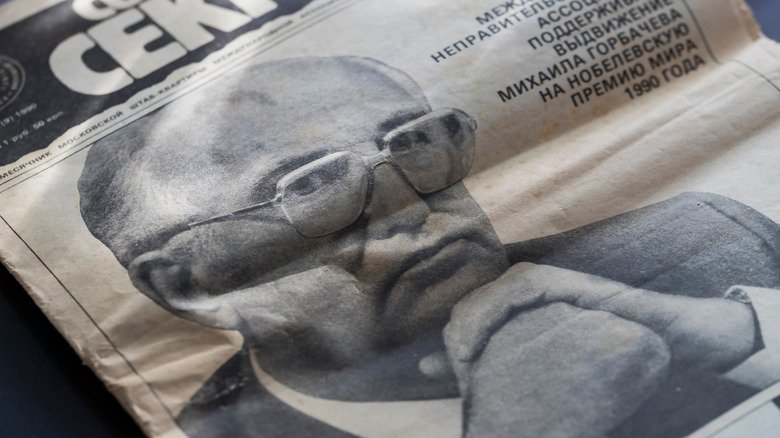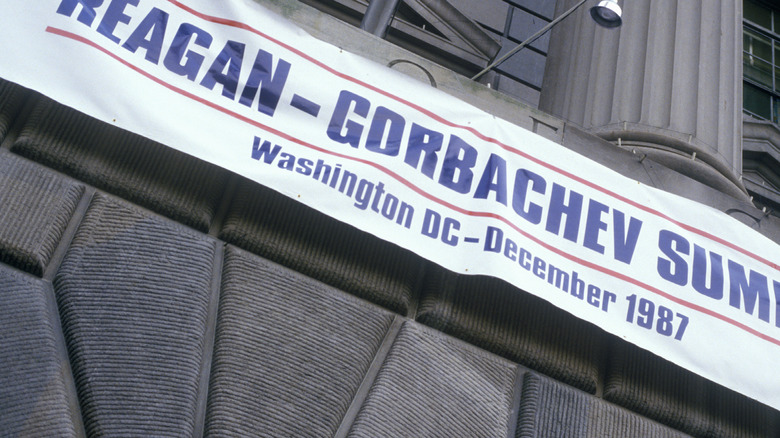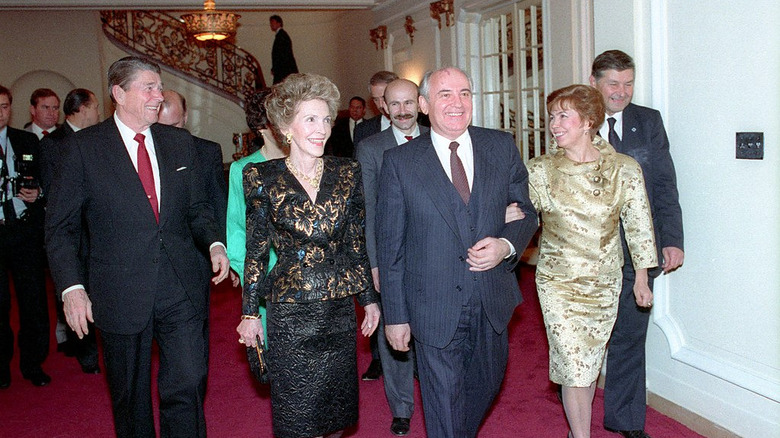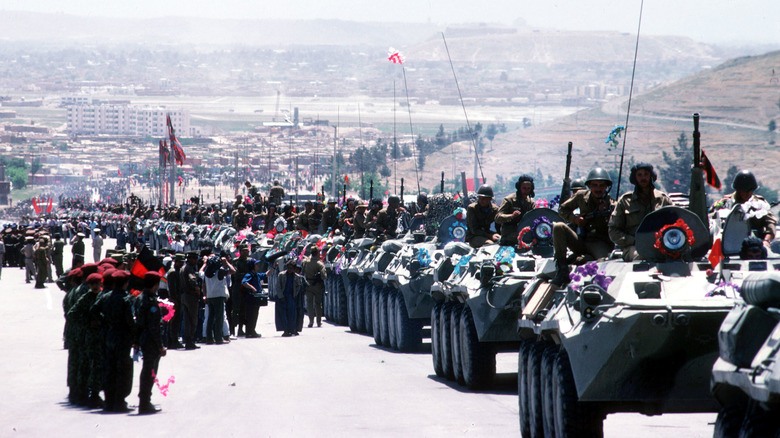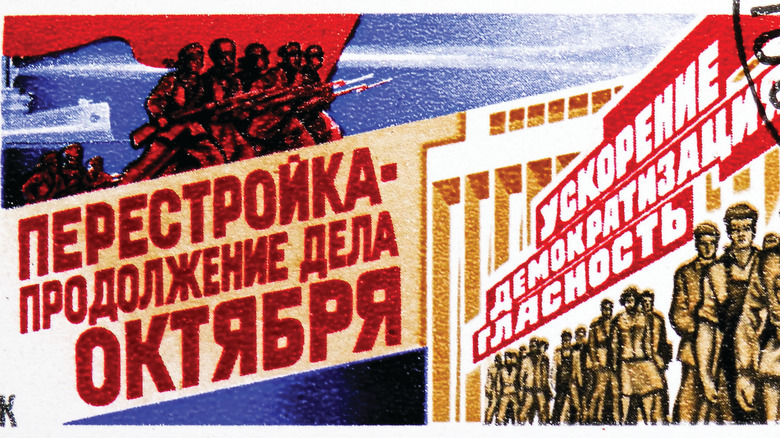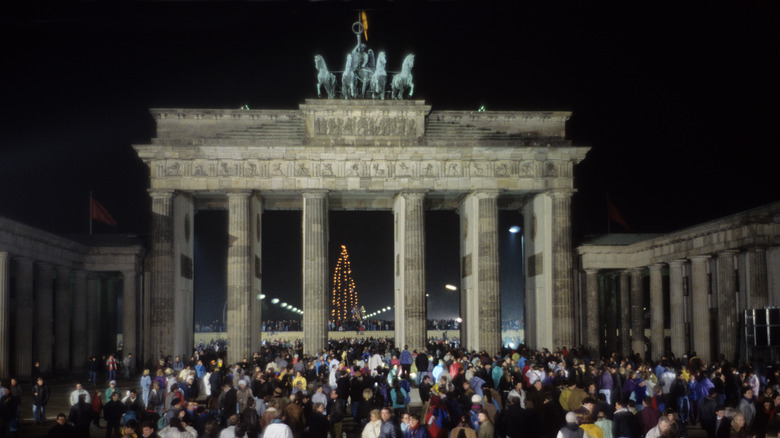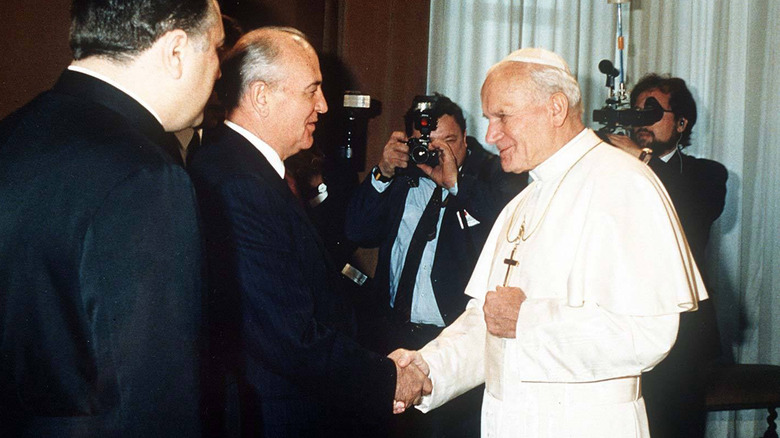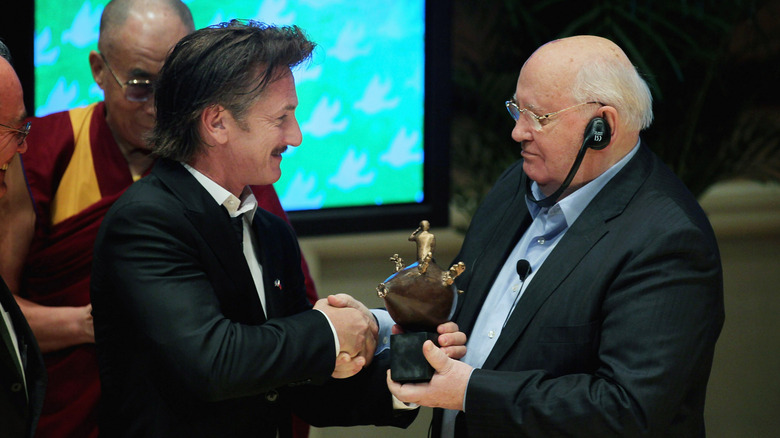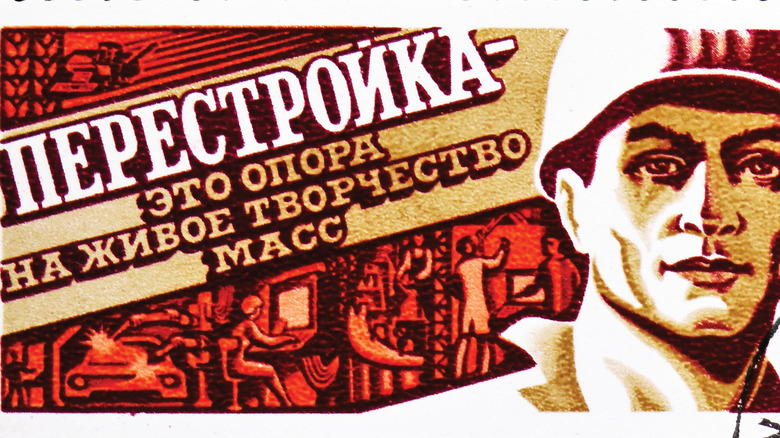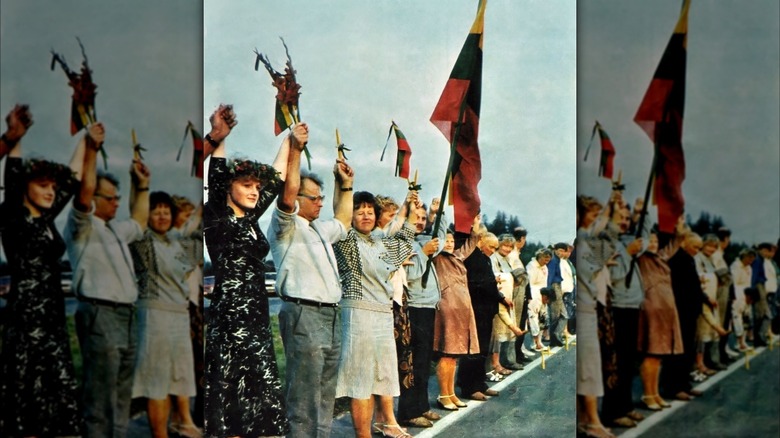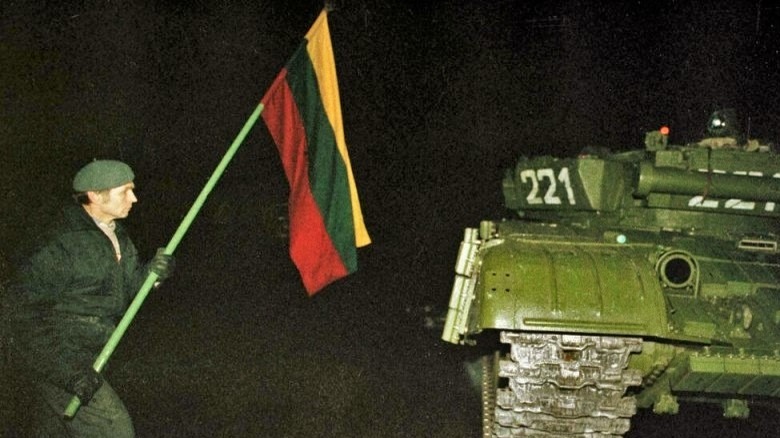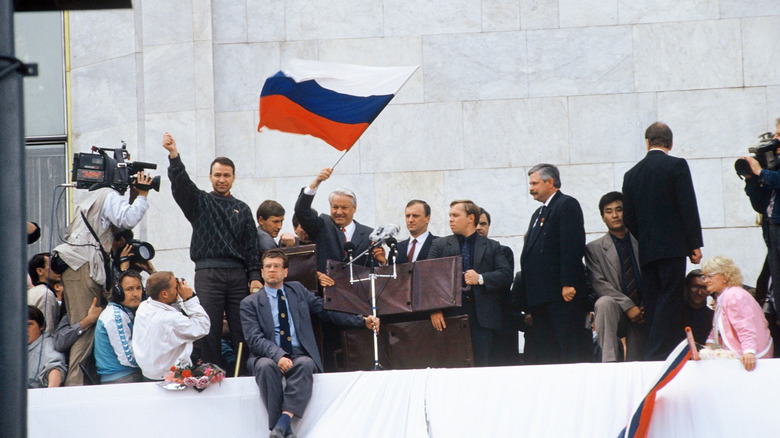The Truth Of Mikhail Gorbachev's Nobel Peace Prize
In 1990, the Norwegian Nobel Committee awarded Soviet premier Mikhail Gorbachev the Nobel Peace Prize. According to the 1990 press release from the Nobel Committee, it came as the result of his "many and decisive contributions [to] dramatic changes ... in the relationship between East and West." This decision seemed natural. Gorbachev had opened Soviet society to the West while pursuing friendly relations with the United States and Western Europe in hopes of ending the Cold War and bringing the USSR into the international community.
There were criticisms of Gorbachev, however. Although praised for non-interference in the Warsaw Pact states that allowed democratic revolutions to occur in 1989, his use of force against independence activists within the USSR is often forgotten, and he is still considered, per PBS, a great humanitarian. But these were just Western perceptions. Gorbachev really had hoped to remake the USSR into a European and global leader. The Nobel would have been the icing on the cake. Here is the story behind the prize, the man, and the myth that was generated in the pivotal years of 1989-'91.
The rationale
The improved relations between "East and West" likely refers to Gorbachev's vision for a reunited Europe at peace with America, not shadowed by the threat of war between the United States and the Soviet Union. In an address to the Council of Europe in 1989, before he accepted the prize, Gorbachev noted that the U.S. and the USSR were, by virtue of their histories and heritage, part of the European world. Therefore, both countries should be part of an European economic federation stretching from the Atlantic Ocean to the Ural Mountains. Any threat of war or even geopolitical tension between superpowers would only obstruct Europe's development, he claimed.
Gorbachev's speech suggests that his ultimate goal was to reposition the Soviet Union within a new European framework that would give the USSR greater influence in the affairs of the continent and the world. In effect, it almost appears that he wanted in a way to merge the USSR with the United States and Europe economically, but not politically. As The Guardian notes, Gorbachev had no interest in bringing down socialism and communism. They were key to maintaining Soviet influence in Europe — just through other means. But in the process, Gorbachev helped end conflicts, reduce weapon stocks, and promoted peaceful solutions. And inadvertently, he ended the USSR.
The 1987 Washington Summit
Having come to power in 1985, Mikhail Gorbachev set about opening relations with the United States. After all, this "common European home" could not be achieved if Europe was split into warring camps dominated by nuclear-armed superpowers. In a joint memorandum summarizing the 1985 Geneva Summit (via UCSB), both powers committed to ending the arms race and reducing nuclear and chemical weapons alongside a host of other issues. At the 1987 Washington Summit, he and President Ronald Reagan successfully implemented steps to nuclear disarmament.
Despite mutual misgivings, according to an address to the Soviet Politburo in 1987, Gorbachev saw the 1987 summit as a success. Although the National Security Archive notes that the summit was full of disagreements, Reagan and Gorbachev did manage to negotiate the Intermediate Nuclear Forces (INF) Treaty. The U.S. and USSR agreed to destroy short and medium-range nuclear missiles.
Gorbachev, however, argued that the summit's real success lay in transforming the USSR's public image. No longer associated with Reagan's "evil empire," members of America's business, entertainment, youth, press, and academic establishments all sought to meet him in pursuit of American-Soviet cultural and economic cooperation. Perhaps the two states could even be the key to ending global conflict. So in this regard, Gorbachev's influence in creating a new East-West paradigm cannot be understated. After all, it won him the Nobel.
Measuring down: unilateral arms reduction
Following the 1987 summit, Mikhail Gorbachev made good on his promises to reduce the threat of military confrontation. Writing in The Hill, former DOS analyst Marik von Rennenkampf noted that the Reagan Administration engaged in a massive military buildup, presumably to pre-empt an expected Soviet buildup, a feature of the Cold War arms race. Saving his biggest criticism for Reagan's expensive Strategic Defense Initiative (aka Star Wars), von Rennenkampf noted that Gorbachev made no attempt to outspend the United States. In fact, he did the opposite.
In a 1988 speech before the U.N. General Assembly, Gorbachev cut the Red Army by 500,000 men and withdrew 50,000 soldiers from the Warsaw Pact states. But the speech was a call for the creation of a new global paradigm in which world politics were not a zero-sum game. So instead of arms races and economic competition, countries would have to start working together, developing the entire world. Obviously, this controversial ambition would require knocking down boundaries and sacrificing self interests for a greater global good.
Despite the humanitarian tone of the speech, there was an agenda behind it in support of Gorbachev's vision of what he called a "common European home" (via the Guardian). But this political, economic, and cultural merger (which would allow the USSR to preserve European influence without its satellites), was impossible in a divided Europe. If the USSR was going to obtain its influence in the new "united Europe," Gorbachev needed rapprochement with NATO and the U.S., and this gesture of goodwill was a way forward. But first, there were some loose ends to tie up.
Exiting the Afghan quagmire
The Soviet invasion of Afghanistan began in 1979 as an attempt to prop up the communist People's Democratic Party of Afghanistan (via Asian Survey). By 1986, however, the invasion had become a quagmire as Soviet forces faced the increasingly powerful American-backed Mujahideen. Thus, Mikhail Gorbachev faced a dilemma. Withdrawal would be akin to admitting defeat and signal to other Soviet client states in Central America, Africa, and Asia that Moscow could not be trusted.
As The Diplomat reported, Gorbachev and the USSR opted to withdraw from Afghanistan anyway by 1988. As professors Rafael Reuveny and Aseem Prakash note in the journal RIS, withdrawal was the only real option. The expensive war had caused a meteoric rise in drug addiction and anti-Soviet (or anti-Russian) sentiment that threatened to fracture the USSR while destroying the Red Army's morale.
According to internal Politburo documents (via the Wilson Center), the USSR was planning on withdrawing from Afghanistan unilaterally. But the 1988 Geneva Accords allowed a positive spin. The Diplomat notes that the accords between Pakistan and Afghanistan were jointly mediated by the United States and the USSR. Among the conditions were strict Soviet adherence to a withdrawal timetable while the United States agreed to halt arms shipments to the Afghan Mujahideen. Thus, the agreement was sold (at least in the West) as a diplomatic triumph of cooperation between two rivals — a sign of thawing relations. On the Soviet side, Gorbachev argued that with Afghanistan in the past, the USSR could focus on internal reforms.
Glasnost
Among the reforms that the Nobel Committee highlighted was the "greater openness" that Mikhail Gorbachev brought to Soviet society. This was likely a reference to the state policy of Glasnost, which in Russian translates literally to "openness." According to Russia Today's Russipedia, the USSR adopted the policy to avoid economic and intellectual stagnation in favor of creativity, innovation, debate, and democratization.
The policy was relatively straightforward. The USSR repealed a battery of laws and restrictions on media, culture, and academia. For the first time, foreign media could be disseminated in the Soviet Union. New newspapers and magazines were founded that publicized debate on dissenting and formerly banned ideas. From Gorbachev's standpoint, the policy made sense. If the USSR was going to be integrated with the rest of Europe, Soviet citizens could not be isolated from their brethren.
Although it earned Gorbachev the Nobel, Glasnost was a double-edged sword. As Russia Today notes, it allowed Soviet citizens to witness the prosperous economies west of the Iron Curtain. Suddenly, the USSR was not the socialist paradise it portrayed itself to be. The limits of Glasnost became clear, however, once the state's dirty laundry from the Stalinist era became public. When Soviet complicity in the Molotov-Ribbentrop Pact (via Russian Review) with Adolf Hitler's Germany came out, it set in motion the events that would collapse the USSR.
Peeling back the Iron Curtain
The USSR's demise came gradually and yet so suddenly in part due to Mikhail Gorbachev's Glasnost. The first phase was the collapse of the Warsaw Pact countries (aka the Soviet Bloc) of Eastern Europe. According to the CVCE, Gorbachev's conciliatory attitude towards NATO and the liberalization of certain aspects of Soviet society emboldened anticommunist activists in Eastern Europe.
Before the 1980s, the Soviet client governments had always relied on Moscow's military might to shore up their positions against populations that generally hated them. In 1989, they believed that Gorbachev would protect them. Instead, however, he refused to intervene. Poland was the first domino to fall, when the Solidarity Movement, backed with the power of the Holy See (via PBS), swept Polish elections and broke with the USSR. Soon, Hungary, Czechoslovakia, and Romania followed, the latter violently. On November 9, the Berlin Wall fell and Germany was reunited amid jubilation and celebration.
This is where the story of Gorbachev's Nobel gets interesting — and convoluted. The Nobel Committee noted that his laissez-faire approach resulting in Eastern European liberty earned him the prize. But the journal International Affairs noted that Soviet loss of Eastern European political monopoly seemed a small price to pay for the possibility of obtaining a key role in the leadership of a European federation (at American expense). There was no point in maintaining these states by force where soft influence might be more effective. Without any conflict in Europe, the Cold War was effectively over.
The end of the Cold War
In 1989, at the Malta Summit with U.S. president George H.W. Bush, Mikhail Gorbachev declared, "We are at the beginning of a long road to a lasting, peaceful era" (via BBC). This was the end of any possibility of hot war between the United States and the Soviet Union. The message was not lost on observers. The Cold War was over.
The Malta Summit and the meetings that preceded it were full of significance for all involved. On December 1, Gorbachev met with Pope John Paul II in the Vatican. According to the transcript of their conversation (via GWU), the pontiff praised Gorbachev for his reforms, especially the legalization of the Greek Catholic churches in Ukraine and Belarus. Referencing the Catholic-Orthodox split, the pontiff claimed it was time for Europe to "breathe with two lungs" to achieve its full potential. This was high praise considering the USSR had allegedly had a hand in an attempt to kill the pontiff in 1981 (via History).
The Malta Summit followed one day later. In the draft directives (via GWU), both sides acknowledged the end of the Cold War in favor of economic, cultural, and international cooperation between Europe, the USSR, and the U.S. All parties would adopt a platform based on "universal human values" to tackle the problems of the future, whether environmental issues, terrorism, or arms reduction and nuclear non-proliferation. If Gorbachev's Nobel was for completely changing the face of European diplomacy, he thoroughly deserved it. But because of his role in communism's collapse, he soon became seen as a humanitarian icon too.
Mikhail Gorbachev, humanitarian
Mikhail Gorbachev did not only receive the Nobel. In 1990, he was honored with a staggering five human rights awards and has since then, per the Gorbachev Foundation, received many more. According to the Washington Post, he received the Albert Einstein Prize, the Franklin Delano Roosevelt Freedom Medal, the Martin Luther King Jr. International Peace Award, the Martin Luther King Jr. Non-Violent Peace Prize, and the "Man of History" Award.
All of these prizes were normally given to people that had helped further the cause of international human rights usually through non-violent means. The FDR award was for furthering the freedoms of speech and religion on one hand and freedom from want and fear on the other. In terms of furthering all of these abroad, one can make the strong argument that he deserved these prizes, even if humanitarianism does not appear to have been Gorbachev's main agenda in pursuing greater openness. But they are controversial, and with good reason. Gorbachev's reforms and reactions to opposition within the USSR suggests that his image as a beacon of human rights was not completely deserved. In fact, as the CVCE notes, his seemingly-humanitarian reforms were in part to focus attention on keeping the USSR intact. And he had quite a battle on his hands because his reforms were not popular at home.
The reception back home
Mikhail Gorbachev's policy of Glasnost was well received among Soviet youth, but his policy of Perestroika, which refers to an attempted restructuring of the Russian economy, was less popular. To understand what happened, it is necessary to understand the Soviet economy. As George Mason economics professor Peter Boettke notes (via FEE), the Soviet economy was centrally planned. A cadre of bureaucrats regulated virtually all parameters for economic activity and destroyed most incentives to innovate. In short, the system benefitted bureaucratic largesse at public expense. Economic success was, at best, difficult without Communist Party patronage.
The CVCE notes that Gorbachev knew this system was untenable against the prosperous, capitalist West, whose fruits were now in plain view under Glasnost. So he introduced elements of market capitalism at the expense of government intervention and subsidies. But as Boettke notes, he did not replace government patronage with any concrete measures to fill the vacuum with private enterprise. Boettke's solution of economic shock therapy is another debate, but regardless, as History notes, Perestroika produced quite a bit of hardship.
The loss of massive government subsidies that had allowed the Soviet agricultural sector to produce cheaply (but inefficiently) led to skyrocketing food prices. Attempted economic stimuli created inflation without the expected free market economic activity. The worsening economic situation (especially compared to the prosperous West), led non-Russians in the USSR to ask if they were truly better off under Soviet rule. Under Glasnost, they could openly express these sentiments. In the ensuing events, Gorbachev's Nobel would prove a tad premature.
The Baltic Way
Emerging Europe notes that Mikhail Gorbachev repealed the Brezhnev Doctrine, which justified the Soviet use of force to protect its Eastern European communist satellites. Gorbachev's refusal to intervene in Europe signaled to independence movements inside the Soviet Union that perhaps the premier would allow them to separate as well. They were wrong.
Nowhere was pro-independence sentiment stronger than in the Baltic states of Lithuania, Latvia, and Estonia. According to Estonian World, Gorbachev's policy of openness had led to the disclosure of the Molotov-Ribbentrop Pact and its set of secret protocols, wherein Joseph Stalin's USSR and Adolf Hitler's Germany had carved up Eastern Europe in a prelude to their joint invasion of Poland. Among Stalin's victims were the three independent Baltic States, which were militarily occupied and annexed to the USSR through sham elections.
Once the details of the pact came out, a massive protest called the Baltic Way broke out in which 2 million Lithuanians, Latvians, and Estonians created a human chain through their capitals. Gorbachev and the Kremlin threatened to crush the rising, fearing that it might inspire similar actions throughout the USSR. The threats did not materialize — at least not immediately. But when Soviet troops finally intervened, Gorbachev's true agenda came out: he intended, contrary to his humanitarian image today, to keep the USSR together (via the Washington Post) — by force if necessary.
Gorbachev the authoritarian
Emerging Europe notes that Mikail Gorbachev did not extend the courtesy of self-determination to the Baltic states. But although he wanted to keep them in the USSR, according to Foreign Policy Magazine, his hands were tied. His reformist image could not sustain a repeat of China's brutal Tiananmen Square crackdown, which had inspired worldwide condemnation.
Eventually, Lithuania forced Gorbachev to choose when it declared independence in 1990-'91. Gorbachev decided to follow the Chinese example. After demanding that Lithuania rescind the declaration demands to renounce the declaration, Soviet tanks rolled into Vilnius early in 1991, leaving 700 protesters injured and 14 dead. Iceland, followed by the rest of the world, recognized Lithuania (via Iceland Monitor), leaving Gorbachev and the USSR humiliated and the premier's image tarnished. Although the New York Times tried to run damage control for Gorbachev, other corners of the U.S. media criticized him. The Washington Post opinion section ran two pointed pieces attacking public perception of Gorbachev as a humanitarian. The paper also reported that small but vociferous groups of protesters had called for Gorbachev's Nobel to be revoked.
Gorbachev's actions in Lithuania shocked some, but were unsurprising. Soviet rule had historically depended on repression to keep the country's non-Russian nationalities in line, and it was not the first time force had been used on independence activists. According to Radio Free Europe, in April of 1989, Soviet forces had gunned down 20 demonstrators in the Georgian capital of Tbilisi. But it was a losing battle. Events outside Gorbachev's control brought down the USSR and the constituent republics became independent.
Destroyer of the USSR?
The Brookings Institute notes that Gorbachev is seen as the man that helped bring down the USSR. This view is partially true. Gorbachev's policies, per Brookings' analysis, helped accelerate the end of the USSR by worsening the economic situation and breeding social instability. Soviet hardliners arrested and deposed Gorbachev in 1991, fearing that he was demolishing the country. Only the intervention of Russian SSR president Boris Yeltsin saved him. But by then, Gorbachev's authority was gone.
Nevertheless, Gorbachev wanted to keep the USSR alive. According to CSCE, he held a referendum in 1991 in which Soviet citizens were asked if they wanted to preserve the Soviet system of government. Despite a boycott by five republics, 80% of voters gave a 76% return in favor of preserving the USSR. According to the Moscow Times, even Gorbachev himself was stunned by the results. It appeared a validation of his tenure despite worsening economic conditions and secessionism within the USSR.
Despite the referendum, the coup attempt sealed the USSR's fate. Boris Yeltsin and his Ukrainian and Belorussian counterparts dissolved the country by mutual consent in December of 1991. An embattled Gorbachev resigned, explaining his decision to the BBC in humanitarian terms. In a country awash with nuclear and conventional weapons and riddled with ethnic tensions, civil war was guaranteed if he made any more efforts to hold the USSR together by force. That perhaps, is what should have earned him the Nobel Peace Prize — averting a post-Soviet bloodbath in favor of a painful but peaceful transition.
